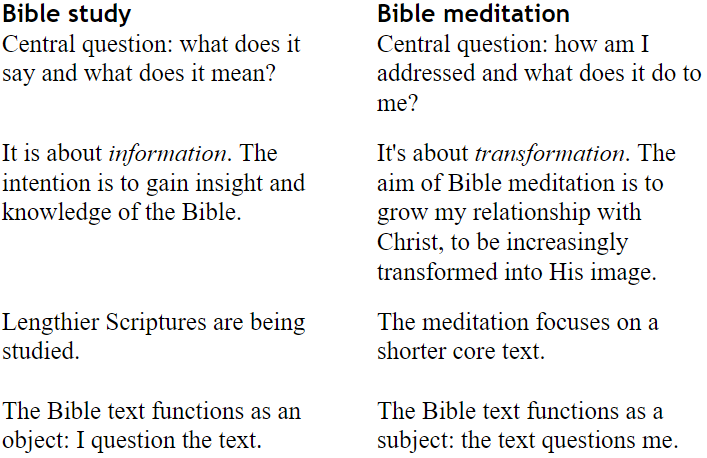Lesson 6: Meditating the Word of God

In this chapter we proceed to discover what lectio divina is. The subject of this lesson will be the second step: meditating or contemplating (meditatio).
6.1 The second step: meditating
The meditatio is about connecting your heart and your mind to the true meaning of the written words. Here it becomes personal. What does it do to me? What does it mean to my everyday life? Do I think it is beautiful, of difficult? What thoughts, feelings, images does it evoke? Does it make me recall other parts of the Bible? These are just some of the questions that might appear in this phase.
To meditate means: savoring what is said, trying to sense how it touches your heart and your life. In lesson 4 (the first one about lectio divina) I summarized it briefly with this pointer: you contemplate these words and associate them with your life, your experiences, and your feelings. Contemplate should not be taken too rationally here, it is about absorbing the words, ‘thinking with your heart’. But your mind is needed too.
You may sense that I am looking for the right words. That’s because I don’t want to create a dissonance between mind and heart. That happens quite often. Then the mind represents rational thinking only (and seen as inappropriate), and heart signifies feelings and emotions (which is considered all right).
The ‘Desert Fathers’ (monks from the first centuries AD) put very nicely: ‘To pray is to descend with the mind into the heart.’ Your mind, your thinking is still actively involved, but meditation is about that deeper path of the heart.
6.2 Life, experience, feeling
The step of meditatio is all about allowing the Scripture you’re reading to percolate and to gradually discover how it relates to your life, your experiences, your feelings. Your life: what is going on in your life right now, and how do these words comment on it? Your experiences: what do you carry inside yourself, and how do these words shine new light on it? Your feelings: do the words bring joy, rest, security, peace? Or do they evoke feelings that confuse you, or make you angry, sad, or worried?
Because that is also part of it. God’s words are often at odds with your life and show where you are found lacking. God’s words speak of things that you think you cannot reach at all and leave you feeling discouraged. God’s words sometimes seem to come from a world unknown to you. Or they challenge you to do something that seems incredibly difficult.
All that can arise in meditatio, but hopefully also a lot of recognition, revelation, faith and trust. And you may already sense that doing this in your meditation very naturally leads to prayer, the next phase. In the previous lesson I explained that in reality meditation and prayer can blend together. And that’s fine. It is not about neatly separated steps, but about a fluent movement in which the Spirit takes you through God’s words to God’s heart.
6.3 Study and meditation
In the comparison below I will elaborate a little on the duality that I already mentioned of head and heart. For convenience I made a distinction between Bible study on the one hand and Bible meditation on the other. Each method of examining the Bible is valuable in it’s own way. But they also differ from each other.

I will explain this in more detail: The first thing mentioned in the preceding comparison is that the central question in Bible study is “what does it say” and “what does it mean”, and in Bible meditation it is “how am I addressed” and “what does it do to me”.
You can feel that these are two different questions. That one question: what exactly does it mean, what does it say exactly, that’s a great question of course. But Bible meditation is first and foremost about the question: what does it mean to me? How does this affect me in my personal life? What does it do to me?
Another distinction between the two: in Bible study it is about information, and in Bible meditation it is about transformation. Bible study helps to grow in understanding and knowledge of the Bible, and Bible meditation is about growth in my relationship with Christ, to be increasingly transformed into His image.
There is nothing wrong with information, it is wonderful to gain knowledge, and yet in Bible meditation it is first and foremost about alteration, renewing, to be transformed by letting the words of the Bible act on you.
A third difference is: in Bible study often lengthier parts of the Bible text are studied, and in Bible meditation, you mostly focus on a shorter core text.
Well, that’s how I deal with lectio divina myself. Of course you can also do lectio divina with longer texts, but still, I prefer a shorter text, to really concentrate on that. This really is a significant difference; to study a larger text, the whole of a psalm, a whole book, or a complete chapter of the Bible, as opposed to meditation where you mostly want to be addressed by that one text.
Finally is mentioned as a distinction, in Bible study the text functions as an object (I ask the text questions) and in Bible meditation the Bible text functions as a subject (it asks me questions). Those are perhaps some tricky words, object and subject. What is outside of me is the object, I look at that Bible text, I ask that Bible text questions, I study that Bible text. You can say, I bend over that Bible text. But in Bible meditation I bend, as it were, under that Bible text. That text is going to appeal to me. I’m not going to dictate what that text means, but that text is going to give me meaning and tell me who I am. So I am brought into a process of asking questions about me, instead of me asking the Bible text questions.
I hope this makes the difference between Bible study and Bible meditation a bit clearer. Again, both are by all means worthwhile, but in this course, we are mainly focussed on Bible meditation.
Reflecting
1. Which thought or which insight from the above is new or renewing to you?
2. Think back to times where you did Bible study and also times when you were more meditative about God’s Word. What are the differences between them for you?
Practicing
Psalm 143 is a beautiful psalm. Someone once told me that she was going through a period of depression for a long time. How difficult for her to have faith then! But day after day she read psalm 143 because it made her feel known and seen, and she could still feel comforted by the Holy Spirit.
Read this psalm in its entirety again. You can now choose a verse yourself for doing a lectio divina exercise with it, or you can take the two verses that appeal to me right now, psalm 143: 5-6.
I remember the days of old;
I meditate on all that you have done;
I ponder the work of your hands.
I stretch out my hands to you;
my soul thirsts for you like a parched land.
Before your lectio divina exercise you could listen to ‘Be Thou my vision’, an Irish hymn. This song shows beautifully the transformational power there is in the Scriptures in asking the Lord to become your best thought, your wisdom, and your vision.
Inspiring quote
Martin Luther was a monk before he became a reformer. He also spent his whole life meditating, and often wrote about it. Here is a brief explanation from him on meditation.
[…] you should meditate, that is, not only in your heart, but also externally, by actually repeating and comparing oral speech and literal words of the book, reading and rereading them with diligent attention and reflection, so that you may see what the Holy Spirit means by them. And take care that you do not grow weary or think that you have done enough when you have read, heard, and spoken them once or twice, and that you then have complete understanding. You will never be a particularly good theologian if you do that, for you will be like untimely fruit which falls to the ground before it is half ripe.
Thus you see in this same psalm (119) how David constantly boasts that he will talk, meditate, speak, sing, hear, read, by day and night and always, about nothing except God’s Word and commandments. For God will not give you his Spirit without the external Word. So take your cue from that. His command to write, preach, read, hear, sing, speak, etc., outwardly was not given in vain.
